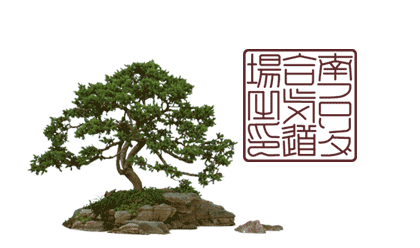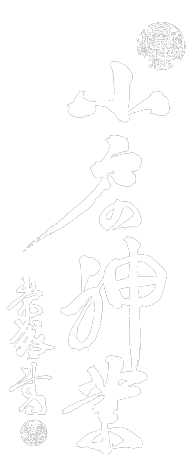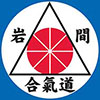


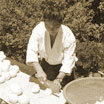
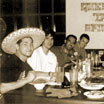
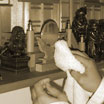
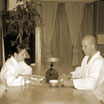

What is an Uchideshi?
Uchi No Deshi is the term that signifies the personal student of the dojo sensei. He is one who lives and trains in the dojo, exclusively immersing himself in "The Way".
A person contemplating becoming an uchideshi should understand that this commitment is not to be taken lightly. Although the rewards for one who completely immerses himself in Aikido training are great, the demands of uchideshi life can correspondingly be just as challenging. Living conditions are austere, and the demands for strict care, maintenance and discipline of the dojo are unrelenting. Training is the foremost priority in the life of an uchideshi. This training is not only more demanding than that asked of the dojo members at large, but far more frequent. For these reasons, one should consider very carefully before committing to a period of study as an uchideshi.
Aikido of South Florida is one of the few and fortunate dojos in the United States that offers an uchideshi program to students all around the world. We have accommodated foreign students from Japan, Germany, Israel, Canada, South America and throughout the United States. For over two decades, Yap Sensei herself has been devoting one to two months every year in Japan as an uchideshi to Morihiro Saito Sensei, 9th dan, and since his passing in 2002, she continues her tutelage under the guidance of Morihiro Saito's heir apparent, Hitohiro Saito Sensei. Yap Sensei believes that Aikido is a never-ending process of development for the mind, body and spirit and feels aikido is an inexhaustible learning process. Serving as an uchideshi every year herself is a responsibility necessary for the development of the students of the dojo, as well as the refinement of her own techniques and personal growth.
Uchideshi Guidelines
We are proud to be the USA representative for IWAMA SHIN SHIN AIKI SHURENKAI, Hitohira Saito Soke and the Legacy of Morihiro Saito Shihan.
In becoming an Uchideshi under Sensei Yap there are several requirements that need to be understood and addressed before either parties commit to a date. Some of these requirements are negotiable, and some are less negotiable, but will be able to discuss them in more detail if needed. Here is a brief synopsis of our program:
- The Uchideshi program was devised for current active practitioners of Aikido to be afforded the opportunity to deepen their training and understand of Aikido.
- The Uchideshi Program is open to all aikido affiliations; HOWEVER, you are here to train Iwama style aikido, in some cases our style will be quite different than that in your home dojo, Iwama style will strictly be enforced. We realized that every dojo, even the same style will have slight differences in techniques based on the instructor's level of teaching: You only need to focus on ours as this is the reason you are here.
- At no time will you actively compare the different techniques learned from other styles to that in our dojo as we are not concerned with what you know and what you have learned other than being able to apply the principles. We ONLY need to focus on what you are learning NOW - at this moment. Focus on the HERE & NOW.
- All adult and children's classes are mandatory unless previously arranged with Sensei. Training all classes will allow you train different levels and perspectives of aikido that are only perceived through these mandatory classes.
- Kihon & Weapons Training: Technically, O'Sensei only emphasized kihon and weapons training in Iwama. The system of training and teaching at ASF, as well as in Iwama, is quite different if you are not use to devoting half of your aikido curriculum to weapons and kihon training. Angle is one of the most important aspects of aikido that diminishes the use of strength when used correctly. This will be one of the many focuses of your uchideshi period.
- The fundamental philosophy of being an uchideshi is the willingness to submit oneself without limits; to understand the demands of curing one's mind, body and spirit through the responsibilities of serving and submitting to the practice of Aikido with an altruistic approach.
It may be too naive to simply say that the only difference in styles is hanmi, kihon training and our weapons curriculum that differs between other styles of aikido and Iwama Style, but if you really look at it, you will be learning a new language, a new body language. Kihon is the basic forms of Aikido, which are formulated on different angles and energy, static grabs. If your hanmi is different, so is your centerline, and so will be your body positioning. Also, if much of open hand techniques are derived form the weapons training, as O'Sensei writes so prolifically and of which other styles minimally include in their curriculum, then you are already negotiating half of what you have already learned. We will be focusing greatly on body positioning during your time here.
Please review these terms and if you have any questions or comments, please do not hesitate to ask. However, upon your arrival you will be presented with our Uchideshi Manual that will complete the program requirements you are expected to uphold.
We look forward to developing a prosperous relationship.
Uchideshi Enrollment Qualifications
- Minimum 6 months of consistent Aikido training
- Must provide a letter of introduction from your current Dojo Cho
- Both men and women are eligible.
- Applicants must be between at least 18 years old, in healthy physical condition and have the ability to train daily.
- Applicants must have a minimum high-school education (diploma or native country equivalent).
- Valid health insurance through the desired length of stay.
- Applicants must be financial capability to support themselves for desired length of stay.
- Religious and other lifestyle preferences are private and should be kept to yourself.
Documentation Required
All applicants must submit the following:
- Color copy of your Driver's License as well as passport
- Valid Proof of Heath Insurance coverage for the duration of your stay
- Letter of introduction from your current instructor
- Completed online Application Form
- A personal Resume including your education, profession, trainings of martial arts
Uchideshi Fees
The cost to be an uchideshi is as follows:
- 1 week $500.00
- 2 weeks $700.00
- 3 weeks $1000.00
- 1 month $1200.00/month
- Training overnight $50 per night
The dues are to be paid at the beginning of your uchideshi period. Please be sure to take care of all your financial responsibilities before your departure, and if you have made any long distance telephone calls, please be sure to account for those bills as well.
Uchideshi fees include instruction, sleeping accommodations and living accommodations (consumption of electricity, water, internet and use of facilities). The total payment must be made at the time of registration. These fees do not include any seminar fees, which are to be paid separately.
Uchideshi are responsible for their meals and telephone calls during their stay. The Laundry mat is located upstairs, and the laundry provisions are not included.
Additional costs
Seminar fees and other expenses such as travelling, parties, dojo trips and excursions are of the responsibility of each uchideshi.
Departing uchideshi gift to the Kamisama:
One bottle of sake and the monetary gift of:
- less than or equal to one month: $50.00
- more than one and less than three months: $100.00
- more than three and less than six months: $150.00
- more than six months: $200.00
Uchideshi Testimonials
"I really would like to thanks to Stephanie Yap Sensei for giving me the chance to practice in her Dojo and also for the amazing experience as Ushideshi I had. After a work of two years and a half in Haiti and in between of my final return to Chile, I spend one week practicing with her, Alex Sempai and an excellent group of partners, friends and students who always treated me in the best way and in a very friendly manner. When arrived, I was totally amazed of the level of discipline, compromise and hard work shown by everyone from the beginning to the end of the keiko (this is a very characteristic aspect of the Dojo and you have to be prepared for that). You have to be prepared too, to humbly "open your eyes" and pay attention to the teachings of sensei, trying again and again, step by step to reach to a better comprehension of Iwama Aikido. As many people said, the key thing is "don't hurry up and practice with the heart", the rest will coming in the everyday practice. And one thing is certain: One week is absolutely not enough for an experience such as this! At least you have to be prepared for three weeks or a month, or even more time of practice with sensei if you really want to move forward and really make the very best of your time as Ushideshi. I wish I could stay longer but was not possible since I had to come back to Chile after a long time abroad.
Nevertheless, I would like to thank again to sensei and all the people I met, my friend Mark, Karel, Hassan, Noam, Alex, Veronica, Pavan, Elizabeth, Ariel, Greg, Chai, everyone. Thanks a lot for the patience and the excellent practice we share together. Also for the beers and the food! Was great. A special greeting to all the kids from the kids class too! Unforgettable energy of those classes! I wish I have the opportunity to see the whole group and practice again with my friends from Aikido of South Florida, either, in Miami or Chile. Domo arigato gozaimashita"
Jorge Vásquez
Santiago, Chile
To experience what it would be to breath aikido all day, I travelled from the Netherlands to sensei Yap's dojo to live as uchi deshi for two weeks. Though I did not fully know what to expect, these two weeks have been absolutely great. Sensei Yap is a great but demanding teacher and you will get nothing for free. Classes are very intense, both physically as well as mentally, yet very rewarding for those with an open mind and eagerness to learn. See for yourself what happens when you have nine children coming at you with fire burning in their eyes in a randori!
Most striking however is the atmosphere. A dojo can only thrive through the commitment of all those involved, be it sensei Yap, students, parents or the wider community. I believe that on this aspect ASF truly stands out. The dojo is more than a place to train and friendship is extended to those willing to adapt and share its common values. People are very amicable, are willing to show you around, take you on a biking tour through the Everglades or just simply grab a drink with you after class.
For those of you reading this and considering to become an uchi deshi, just do it. Leave your egos at home, rid yourself of any prejudices and simply embrace the experience, you will not regret it! (And the kids classes are so much fun)
Bas Jonker
Netherlands
After training aikido for approximately 1 year and wanting to improve my quality of life, the opportunity arose for me to enroll in an uchideshi program. Even though these programs are commonly offered in the Far East, finding one in the United States was a little more difficult. In September of 2000, not only did I find one in the US, but I found one that was extremely traditional in it's curriculum. I then entered the uchideshi program under Yap Sensei at Aikido of South Florida.
During the first several weeks, I quickly realized why this school had a reputation for being so traditional. Yap Sensei herself had spent a substantial amount of time as uchideshi herself in Iwama Japan under Morihiro Saito, the number uchideshi of 24 years for the Founder, O'Sensei, himself.
As an uchideshi I was on the clock 24/7, and because I had initially enrolled for one year, I was allowed 8 hours a day to work a full time job, as long as it did not interfere with the 18 classes per week, or my deshi duties. Being a man in my 30's who like to drink and smoke, this was a challenge. I learned the most important part about committing to uchideshi life was my attitude towards the dojo and fellow students. Because I had a positive attitude and energetic personality, uchideshi life quickly became natural for me.
Uchideshi life can be very simple if you remember three basic rules.
- Sensei's needs come first
- The dojo needs come second
- The students' needs come third
The most difficult aspects about being uchideshi was when other uchideshi came into the dojo, whether they were short term (1-4 weeks) or long term (6-12 months). Now, I was not only responsible for my own actions, but as the senior deshi, I was responsible for everyone actions. At times there were up to 14 uchideshi living in the dojo together! The same Sensei that I had worked so hard to please and was her number one deshi now seemed to have more harsh words than kind words as she entered the dojo, on a daily basis. These people were either going to kill me, or make me a better deshi.
Looking back now, I wouldn't change a thing. Our normal routine after training all week was to go to Sensei's ranch and work on the weekends. One of the most memorable Saturdays was when our project was to build an arbor. If you knew our Sensei you would know this would no normal arbor….it was a monster! For a guy who had never held a hammer in his hand, this was a challenge. Thank god I was not alone. A senior student, long term uchideshi Jason from Michigan, long term uchideshi, Alain from Canada and another from Sweden, Ove, were all there with one mission to complete Sensei's monster arbor. We never minded these projects because we knew even though we were going to work hard, the afternoons would always include ice cold beer, music, home made bar-b-q and great company. This was only one of the many wonderful Saturdays spent with my dojo family. Soon enough, the same people that in the beginning were getting me in trouble, eventually became closer to me than my own family.
As uchideshi, I was able to travel to exotic locations with Sensei and meet many interesting people from many countries who came to live in the dojo throughout the years. Towards the end of my second year, I felt I had found what I had been looking for. I had peace of mind, I physically felt great and realized that this dojo would be part of my future for many years to come. At the ripe old age of 43, I look back and consider those to be the best two years of my life.
SML
I just want to inform anyone interested in participating in the Aikido of South Florida Uchideshi program that you will learn so much more that you ever thought possible no matter how long your stay here. I gained so much insight from just two months of dedication to Sensei and the sempai at the dojo. It was such an incredible experience! This experience has inspired me become a better aikidoist, a better person, and to one day maybe have my own dojo under the guidance of Sensei Yap.
Sensei Yap is extremely intense, in every meaning of the word, and as uchideshi you must be ready to listen well and perform all that is asked of you with integrity. Her instruction is very demanding, on and off the mat, and she always pushes you to do better than you thought you even could yourself. Sensei Yap is hard, and at first it was a bit overwhelming, but gradually with her direction, I managed to make it through with great satisfaction. It was an honor training under her caliber of aikido, and the caliber of her students.
The dojo itself is run far superior than that I have ever seen or experienced. It is extremely well organized, extremely disciplined and the students are also of such high levels as well, no doubt due to the level of instruction they have also received themselves. The senior students knowledge of the details of techniques were quite impressive and how willing they all were to help me and take care of you during my stay. They were very interactive on and off the mat and seemed to always make everyone feel welcome. I feel I am a much better martial artist, a much better person than when I first entered this dojo.
Uchideshi at aikido of South Florida was very challenging, humbling, enlightening and gratifying. I learned so much about myself.
John Haller
Washington
